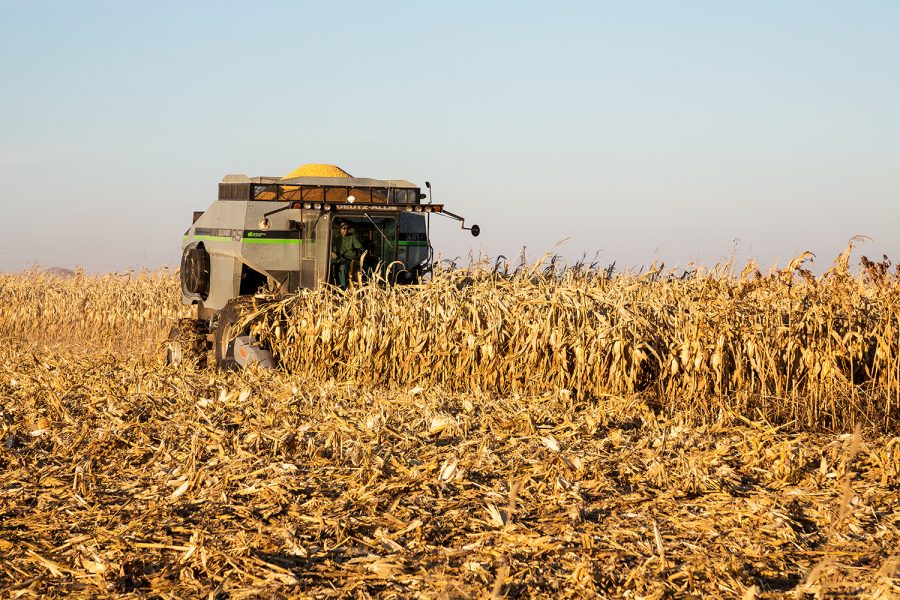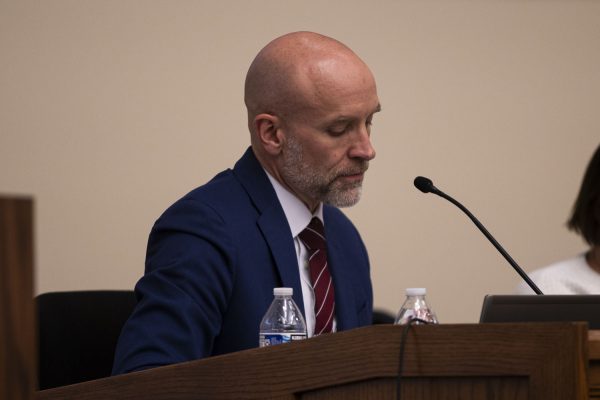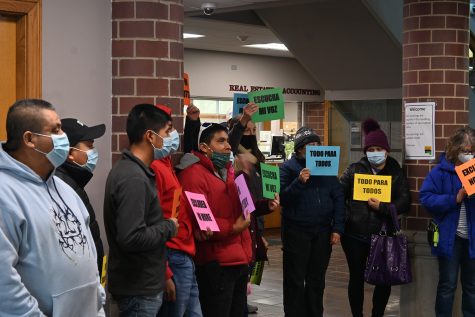Congress passes farm bill, solidifying a 5-year budget for agriculture and food assistance programs
Congress passed the 2018 Farm Bill, and SNAP work requirements are out, conservation program and hemp legalization are in.
A farmer harvests corn near Washington, Iowa on Sunday, Nov. 19, 2017.
December 12, 2018
Nearly three months since its deadline passed, both chambers of Congress approved a finalized version of the 2018 Farm Bill. The farm bill is a sprawling piece of legislation renewed every five years that funds conservation programs, feeds low-income Americans, and allocates aid to farmers.
Sen. Joni Ernst, R-Iowa, told reporters in a Dec. 7 press call that a top priority of hers was maintaining programs that pay farmers to promote conservation efforts, which were on shaky ground during negotiations on the farm bill.
“Conservation has been a very important issue for Iowans in particular. We want to make sure we are protecting the land as well as our water,” Ernst said.
The farm bill passed the U.S. Senate Tuesday night 87 to 13, and the U.S. House 369 to 47. This vote came roughly three months past the bill’s Sept. 30 deadline.
The farm bill faced division in the Republican Party. Iowa’s other Senator, Chuck Grassley, voted against the bill after his amendment that would have limited the number of people eligible for farm subsidies failed.
The bill will allocate $867 billion to the country’s agriculture sector over the course of five years. Congress passed this budget during a lame-duck session, which is the period before newly elected members of Congress will replace those who were voted out in the last election. In January, Democrats will have a majority in the U.S. House.
In the original bill proposal, House Republicans proposed eliminating the Conservation Stewardship Program, which pays farmers for implementing conservation practices, along with improving and maintaining infrastructure that is already in place.
In 2017, Iowa farmers received $3 million in assistance from the CSP. In the final version of the farm bill, the CSP will remain in place.
“It is something that is very important to me, so I will be working to ensure that we keep that funding as it has been,” Ernst said in a press call Dec. 7.
Sen. Jeff Edler, a Republican from State Center and a member of the Iowa Senate Agriculture Committee, said that as a farmer, he’s mindful to use environmentally friendly farming tactics, but said additional funds would ensure more farmers would employ conservation practices.
“Funding is needed to bridge the gap to solve some of the compliance issues,” Edler said.
One sticking point in the 2018 Farm Bill has been stricter work requirements for recipients of the Supplemental Nutrition Assistance Program, formerly known as food stamps, which Republicans proposed in the House. The proposal would have required individuals to work a minimum of 25 hours per week to continue enrollment in the program.
In the final version of the Farm Bill, work requirements for SNAP were removed from the bill.
Ernst co-sponsored the FARMERS FIRST act which made it onto the final version of the budget. The act works to extend more mental-health services and support to rural communities and provide certainty to Iowa farmers, according to a press release from Ernst.
Iowa Sen. Kevin Kinney, D-Oxford, who is a ranking member of Iowa’s Agriculture Committee, said that the new funding for rural mental health was needed in the state of Iowa.
“We don’t have enough providers and enough services especially in the rural areas,” Kinney said.
Grassley attached an amendment to the bill that would have put a cap on the amount of government assistance to farmers in order to redirect funds to those who are in the most financial need.
The new bill extends farm subsidy eligibility to more distant relatives like nieces and nephews of farmers with no new requirements that they have to work. Grassley said in a statement that he is disappointed with the new version of the bill and that this will only allow large farms to receive more subsidies.
Grassley’s amendment didn’t make it into the final version of the bill. The senator attached a similar amendment onto the 2014 Farm Bill that made it through the U.S. House and Senate but was shot down in the Conference Committee.





















